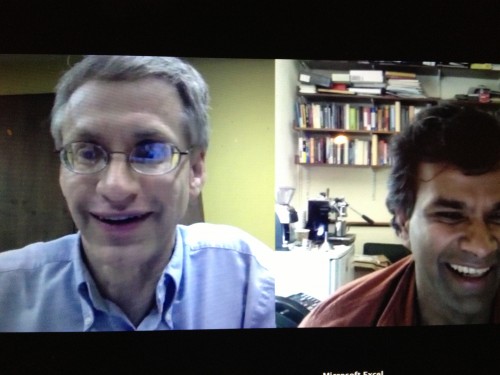Some of the best methodological and policy research is being performed at the boundary of economics and psychology under the broad label, “behavioral economics.” This line of work is sometimes oversold. Yet the combination of psychological insight with pragmatic rigorous experimentation proves fruitful in many areas of healthcare, social services, and public policy. Nobel Prize winner Daniel Kahneman’s account of this field, Thinking Fast and Slow, is now essential reading in many areas–not least in patient risk communication and in the design of useful consent forms.
Sendhil Mullainathan and Eldar Shafir are two leading figures in this field. Mullainathan teaches economics at Harvard and is a MacArthur Fellow. Shafir teaches psychology and public policy at Princeton. This week, they released an accessible short book called Scarcity: Why having too little means so much, which summarizes some of the best behavioral economics work.

Scarcity is especially valuable to anyone who witnesses the tragic reality that many people who live close to the economic waterline behave in ways that hinder their efforts to escape poverty. Low-income workers turn to payday lenders. Welfare recipients fail to take maximal advantage of available training programs. Talented young people miss critical deadlines, and therefore fail 9th-grade English and sabotage their academic efforts….
It’s heartbreaking to witness such things. It’s correspondingly easy to conclude that people who engage in such self-hindering behaviors are myopic, stupid, or impulsive, or are caught in the grip of a deep culture of poverty. Sometimes individual skills and cultural factors really do matter. Yet surprisingly often, these missteps and misperceptions are more contextual, arising through a process Mullainathan and Shafir label the scarcity trap.
Suppose, for example, that a single mom faces an immediate crisis. Maybe she and her boyfriend are fighting over money, and her rent check is due. The crisis encourages “tunnel” thinking, in which she is exclusively focused on an intense set of urgent problems to the neglect of long-term concerns. So she turns to a short-term response such as a complicated and probably rip-off payday loan that covers the rent while worsening her long-term financial problems. This isn’t stupidity. She knows the long-run is important. It’s just that she has only so much bandwidth to worry about everything right now.
Given the economic and personal stresses in people’s lives, such behaviors are neither pathological nor particularly surprising. Mullainathan, Shafir, and their colleague Anuj Shah demonstrated that they could replicate similar self-hindering behaviors among Princeton undergraduates recruited to play video games in clever psychology experiments. A chaotic, hazardous, and confusing environment–not the inherent defects of poor people themselves–elicits poor decision-making.
Although these insights may seem to be academic curiosities, they are actually more than that. And the accompanying message of such research is both optimistic and fruitful. It’s optimistic because it’s at least sometimes easier to change a particular environment than it is to address deeply-rooted problems an individual or family may confront. It’s fruitful because behavioral-economic insights suggest new strategies to design or to improve clinical and policy interventions.
This work also underscores an admirable, empathetic dimension of behavioral economics. People’s decisional mistakes are contextual. Research by Mullainathan and others suggests that many of us who are not poor would make many of the same mistakes that poor people do, if we were forced to make decisions under the same conditions of chronic scarcity that poor people confront.
I caught up with Mullainathan in Wonkblog. Our interview is here.
PS: If you don’t have time to read it, you can get the main point of his book in the classic Borscht-belt joke appropriate to this Jewish Holiday. And yes, I share this with my doctoral students….
….So a man drops off some shirts to be cleaned in a lower-east-side laundry in 1976. He stuffs the ticket in his suit pocket–and forgets to pick the shirts up. Years go by. He moves away. One day in 2010, he’s rummaging through his closet, and he finds the old suit. Rummaging through the pockets, he finds the ticket. He becomes very curious about what exactly happened.
He happens to have business trip in NY. So he brings the ticket. He asks a cabbie to drive him to the old neighborhood. Everything is completely different. But sandwiched between two bodegas is the old laundromat. The same guy is even there behind the counter, now elderly and stooped over.
The customer hands him the ticket, and sheepishly says, “I dropped these shirts off more than 30 years ago. Obviously that’s ancient history. But I’m wondering if you have a place out back or something where you store the unclaimed stuff.
The clerk examines the ticket, and replies, “Oh these. They’ll be ready Thursday.”

